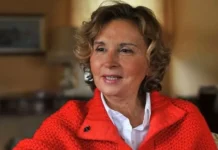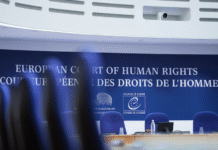An İstanbul prosecutor launched investigation against journalist and Fox TV anchor İsmail Küçükkaya and lawyer Fidel Okan on Tuesday for implying that Turkish Minister of Family and Social Policy Fatma Betül Sayan Kaya’s husband İlyas Kaya used the controversial mobile phone messaging application ByLock.

Denying the claims of divorcing her husband over ByLock use, Minister Kaya tweeted that “the allegations of some media organs about my husband and I are completely false. I am taking legal action against this smear campaign.”
Turkish authorities believe that ByLock is a communication tool among the alleged followers of the Gülen movement. Tens of thousands of people, including civil servants, police officers, soldiers, businessmen and homemakers, have either been dismissed or arrested for using ByLock since the failed coup attempt on July 15, 2016.
Küçükkaya apologized for tweeting about the minister’s private life while standing by his claim that Kaya’s husband used ByLock. An İstanbul prosecutor summoned Küçükkaya and Okan to give their statements against the accusations of “publicly insulting a civil servant” and of “defamation against the government.”
While returning from Poland on Tuesday, Turkish autocratic President Recep Tayyip Erdoğan threatened Turkish journalist and Fox TV anchor İsmail Küçükkaya. Regarding allegations put forward by Küçükkaya of the use of controversial mobile phone message application ByLock by Minister for Family and Social Policy Fatma Betül Sayan Kaya’s spouse, President Erdoğan told reporters on the plane:
“[Regarding the allegations of a divorce between the minister and her husband over his use of the ByLock application], this is shameless, immoral and vile slander. Our lady minister [sic] made a statement [on the issue] reserving her legal rights. This [ByLock allegation] is not true. Whoever shamelessly writes, says, prompts, this shall pay a price for this legally. You can’t make immoral and vile accusations against my lady minister. Someone prompts it on TV and another one reports it in the press. I told our minister [Kaya] that I would follow up on this myself. I also asked her to follow this case [on Küçükkaya],” the Hürriyet daily reported on Wednesday.
Minister Kaya has been known with her provocative acts targeting the European governments under the directives of Erdoğan. Minister Kaya had traveled to Rotterdam on March 11, 2017, to give a speech about supporting a Turkish referendum that would give President Erdoğan more power although the Dutch government had made clear that it did not want Turkish ministers campaigning for the referendum in the Netherlands. The government therefore refused landing rights for a plane bringing Turkey’s Foreign Affairs Minister Mevlüt Çavuşoğlu to the country to give a campaign speech to Dutch-Turks.
After this happened, Minister Kaya had driven to Rotterdam from Germany to give the speech instead, despite the Netherlands not allowing this. The Turkish consulate in Rotterdam did not announce that Minister Kaya was heading to the city. But according to Rotterdam Mayor Ahmed Aboutaleb, the consul did call on Dutch-Turks to come to the consulate on social media.
Aboutaleb forbade Kaya from entering the consulate. After hours of unsuccessful negotiations about Kaya leaving the Netherlands voluntarily, the Turkish Minister had been classified an undesired foreigner and escorted to the border with Germany by the police. After returning to Turkey Kaya had said that the Netherlands robbed her of her fundamental rights and the Rotterdam police treated her entourage with undue force.
In the diplomatic fallout that followed Erdoğan had accused the Netherlands of fascism and Nazism and mass murder in Srebrenica. He had also imposed a number of non-economic sanctions against the Netherlands and demanded an apology. Prime Minister Mark Rutte, however, had stood by the steps taken.
Turkey survived a controversial military coup attempt on July 15, 2016 that killed 249 people. Immediately after the putsch, the Justice and Development Party (AKP) government along with Turkey’s autocratic President Recep Tayyip Erdoğan pinned the blame on the Gülen movement.
Fethullah Gülen, who inspired the movement, strongly denied having any role in the failed coup and called for an international investigation into it, but President Erdoğan — calling the coup attempt “a gift from God” — and the government initiated a widespread purge aimed at cleansing sympathizers of the movement from within state institutions, dehumanizing its popular figures and putting them in custody.
Turkey has suspended or dismissed more than 150,000 judges, teachers, police and civil servants since July 15. Turkey’s Justice Ministry announced on July 13 that 50,510 people have been arrested and 169,013 have been the subject of legal proceedings on coup charges since the failed coup. (SCF with turkeypurge.com)















